
 On the anniversary of Paul VI's election as Pope, it is appropriate to recall the special bond between Benedict XVI and the Pope who named him Archbishop of Munich-Freising in 1977 and three months later, made him a cardinal. For this purpose, I am re-posting some items from the 'coverage' on this Forum of Benedict XVI's special and most memorable pastoral visit to Brescia and Concesio in northern Italy on November 8, 2009, to honor the Brescian Pope.
On the anniversary of Paul VI's election as Pope, it is appropriate to recall the special bond between Benedict XVI and the Pope who named him Archbishop of Munich-Freising in 1977 and three months later, made him a cardinal. For this purpose, I am re-posting some items from the 'coverage' on this Forum of Benedict XVI's special and most memorable pastoral visit to Brescia and Concesio in northern Italy on November 8, 2009, to honor the Brescian Pope.


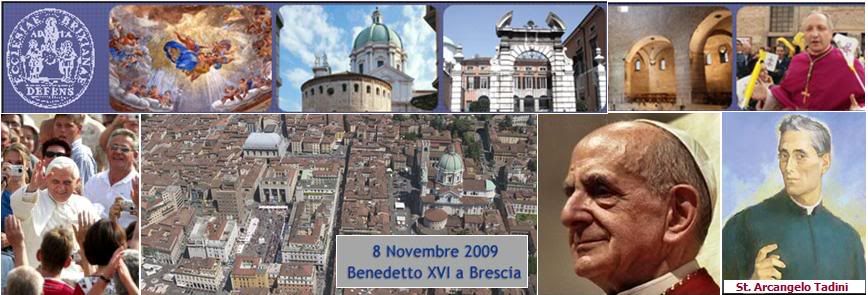 Benedict XVI fulfills
Benedict XVI fulfills
the dream of Paul VI
by Mons. Luciano Monari
Bishop of Brescia
Translated from
the 11/8/09 issue of

November 8, 2009
Brescia welcomes the Pope today. For me, as bishop of this place, and for our Church, the arrival of Benedict XVI represents an encounter of grace which is full of multiple significances. To say so, I wish to cite two texts from the New Testament which help to understand them.
The first is that which recounts the visit Peter makes to the centurion Cornelius and his family (cfr Acts 10,24-33). The centurion welcomes him, inviting him to tell them what the Lord had asked him to.
This is the first significance of the Pope's visit. What we expect of the Pope is that he does in Brescia what his mission is, namely, to announce the Gospel.
The fact of hearing this from the voice of Peter has a power and particular meaning for us. The Gospel remains the most important thing, and the Pope is coming to Brescia in its service.
But there is a second passage which illuminates the sense of this November 8 visit, and it is found in Paul's Letter to the Galatians, where Paul recounts his visit to Peter in Jerusalem.
The Apostle writes: "I presented to them the gospel that I preach to the Gentiles - but privately to those of repute - so that I might not be running, or have run, in vain" (Gal 2,2).
The meeting with Peter was a guarantee for Paul that his announcement of the Gospel corresponded to the faith and mission of the whole Church.
In this perspective, the visit of the Pope to Brescia must be seen as a confirmation that what our Church has done and continues to do is right, lived in communion and with and recognized to be authentic by the Bishop of Rome.
But what is this Church that is about to welcome the Pope? The Church of Brescia is rich for its past as well as for its present - for its human resources, with their creative capacity, and their great willingness to work. But it is also rich in the Christian sense, for the presence of many saints, for institutions born for Christian purposes, for a widespread lay commitment that is both organizational and cultural.
Ours is also a Church that knows suffering, which has experienced and continues to experience moments of hard work, and which faces a future with great problems, with important challenges starting with the lack of vocations and how to bring the Gospel within a lifestyle that has become pagan in many aspects.
But we have deep roots to reach into under such circumstances - and among this is the gift that Brescia has given to the Universal Church in Paul VI. Benedict XVI will be here in memory of Papa Montini, and the Church of Brescia is proud to count Paul VI among her sons.
Such pride is also fed by loyalty which is expressed in a series of institutions, and of well-thought-out initiatives to preserve his memory and to have his life and work known.
A worthy undertaking because, as far as I know, Paul VI is perhaps one of the lesser-known Popes, not known enough for his life and for the values that motivated his actions.
The Church of Brescia seeks to safeguard this memory and to make it live on. It is a commitment that at times needs a bit of effort because attention to Paul VI is not a widespread popular movement. And while it is a great movement, it is not yet a general one.
One of the objectives we have is precisely to make this movement popular, because there are extraordinary elements in the life and spirituality of Paul VI that can inspire personal and communitarian growth.
The visit of Papa Ratzinger reminds us of this further, in the name of a profound bond between these two Popes, a bond that goes far back. Paul VI always sought, in the years of his Pontificate, the nearness of theologians who could express the reality of Vatican II and therefore, the announcement of the Gospel, to the contemporary world, a world that had changed culturally and become indifferent to the Church.
I believe that by nominating Joseph Ratzinger to be Archbishop of Munich, Paul VI was pursuing this objective. Not all the reference points that he thought he had identified had received satisfactory responses in terms of safeguarding that full fidelity to tradition which Paul VI had always sought to live. And from this point of view, Archbishop Ratzinger corresponded to the expectations of the Pope from Brescia.
In a way, the election of Cardinal Ratzinger to the Papacy brings to fulfillment the dream of Paul VI for an announcement of the Gospel to a society in continual transformation, an announcement faithful to tradition but also capable of meeting the issues and cultural challenges of the day. It is an attitude that Joseph Ratzinger always had and that he carries forward today as the Successor of Peter.
Finally, one might perhaps add that the welcome for the Pope today will be an occasion for Brescia to see him as a person, with his teaching, his vision of man and of life.
Serious dialog with an intelligent man is always fruitful, whether one shares his certainties or not. This Pope has always been in dialog with the contemporary world - a dialog that is sometimes severe, as it must be for those who have strong convictions and seek to live them consistently.
But it is certainly a human dialog that hinges on reason, not on selfish interests, on the confrontation of reasons, not on imposition by force. This in itself is gain enough.
We therefore expect to present the Pope this Sunday with a peaceful day among us. Perhaps we will not be able to show him a perfect image of our Church. But we can show him a lively Church which believes sincerely in the Gospel, which loves the Lord, which seeks to grow by overcoming its fears and its inconsistencies.
And the Pope will help us simply by announcing to us the Gospel of Jesus. To hear this Gospel preached to us by the Successor of Peter will be an experience of comfort and joy, both for what the Pope will tell us, and because we shall see in him, in his presence, the fulfillment of a promise from the Risen Lord: "Behold, I am with you to the end of the world". We can ask for nothing more from this encounter with Pope Benedict.
The affinity between two 'teachers'
in words and gestures
by MARCO RONCALLI
Translated from

Nov. 7, 2009
We already noted in a Page 1 story in this newspaper on August 6, 2005 (anniversary of Paul VI's death) the special bond that binds Giovanni Battista Montini and Joseph Ratzinger, two intellectuals who came to the Chair of Peter.
Ir explains one of the reasons for the Pope's visit to Brescia and Concesio. Benedict XVI's presence will be rich with significance, that of Beneict XVI, who is firmly linked to the memory of the Pope who guided the Second Vatican Council and the initial face-off between the Church and the contemporary world.
A memory that 31 years after the Brescian Pope's death, continues to show itself in many ways: sympathy and communion, recognition and affection, convergence of ideas in the exercise of the Petrine ministry, an affinity in framing the dialog with secular culture and in urging greater vitality in Christian witness.
Of course, they have differences, and their styles are different, but the similarities become more evident and more convincing with time - even in their magisterial texts. Just recall in this context Papa Ratzinger's theological rationalism in reinterpreting Montini's teaching, in his revival of
Populorum progressio in the recent
Caritas in veritate.
If it is true, as the Bishop of Brescia has pointed out, that Benedict's visit confirms the path of a local Church that will not turn its back from the transcendental mystery of God, nor close its ears to listing to the Gospel announced with the voice of Peter; and if it is true that Benedict's arrival in Brescia will highlight the patrimony of Christian faith and civic life that the diocese must not only safeguard in memory, but deepen and value even more for their own spiritual growth, then a few facts leap to the eye when comparing the itineraries of Paul VI and Benedict XVI.
How can we forget that it was Papa Montini himself in March 1977 who named Joseph Ratzinger Archbishop of Munich-Freising after the death of Julius Dopfner, and three months after, to make him a cardinal in his last consistory?
How can we forget the appreciation of Paul VI for the work of the young German theologian, first as a consultant at Vatican II, and then as an acute observer of the troubled post-Conciliar years, such that in 1975, he invited him to preach the Lenten spiritual exercises at the Vatican (though the German declined because he felt neither his Italian nor his French were adequate to the task)?
And the telling details that Joseph Ratzinger remembers of his few meetings with the Brescian Pope. Like the ad limina visit of the Bavarian bishops in October 1977, when Papa Montini reminisced about his presence in Munich as a young priest, disoriented at first but soon made to feel at home by so many kind persons. Or the Mass at St. Peter's on Paul VI's 80th birthday, in which the Bavarian cardinal was struck by the Pope's citation of a verse from Canto XXIII of Purgatory in the
Divine Comedy where Dante writes of "that Rome where Christ is Roman" - words that struck Ratzinger because of their symbolic relevance.
Yet another symbol is the series of Patristic texts
Sources Chretiennes which will receive the VI International Paul VI Prize from the Istituto Paolo VI in Concesio tomorrow.
In a ceremony at the new headquarters of the Institute, Benedict XVI will hand over the prestigious award to the publishers of the historic series of books emblematic of the mid-20th century rediscovery of early Christian writings.
It is a gesture that also brings back another affinity that goes back a long way. In 1980, then Cardinal Ratzinger, along with Cardinal Paul Poupard, presided over the first of the international colloquia promoted by the Institute - it took place in Rome on October 24-26, on Paul Vi's encyclical
Ecclesiam suam.
From that day in Brescia, here is Benedict XVI's homily in whichhe paid tribute to Paul VI:

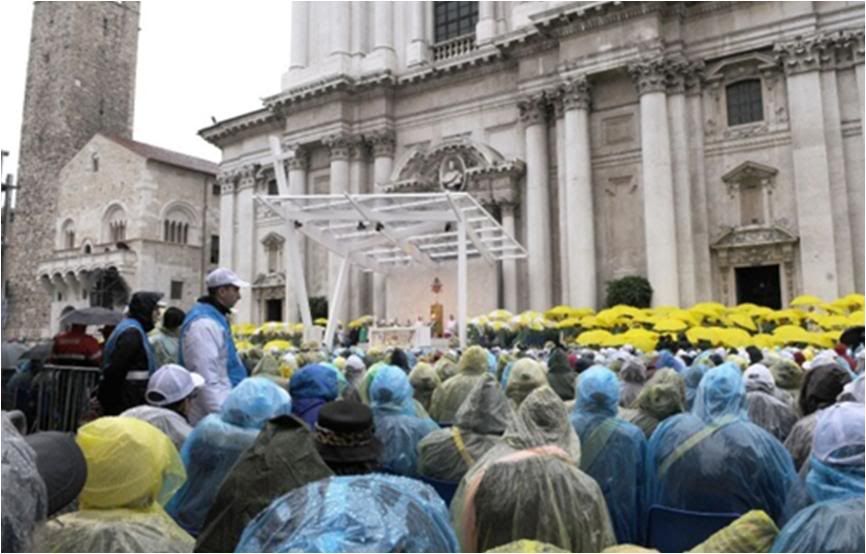
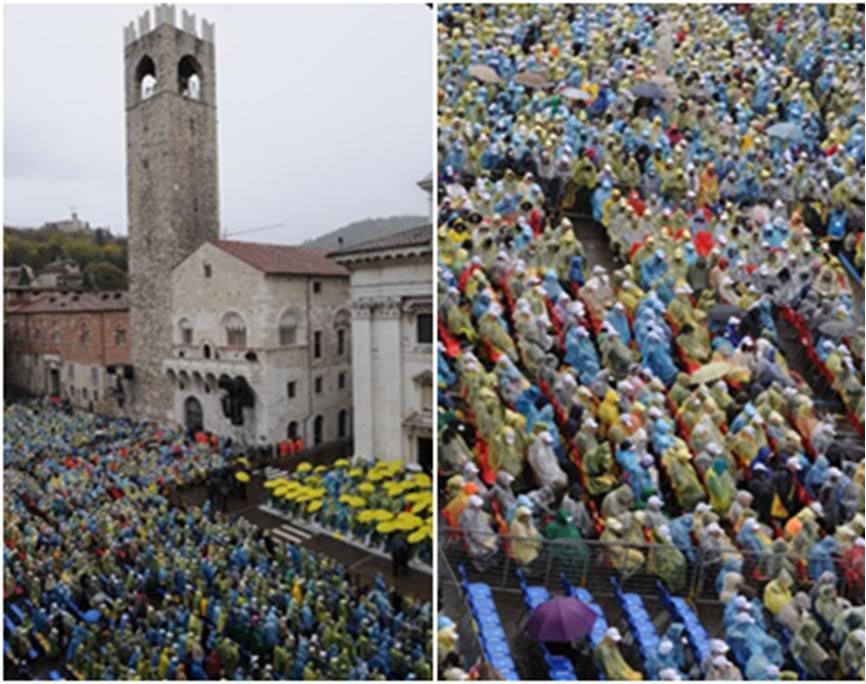
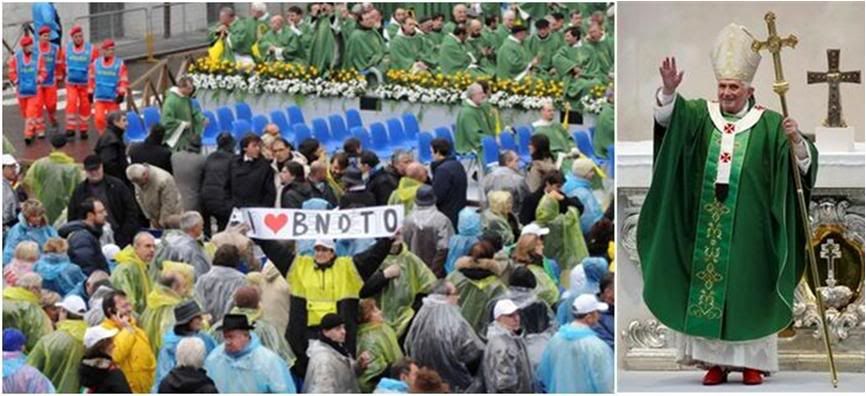
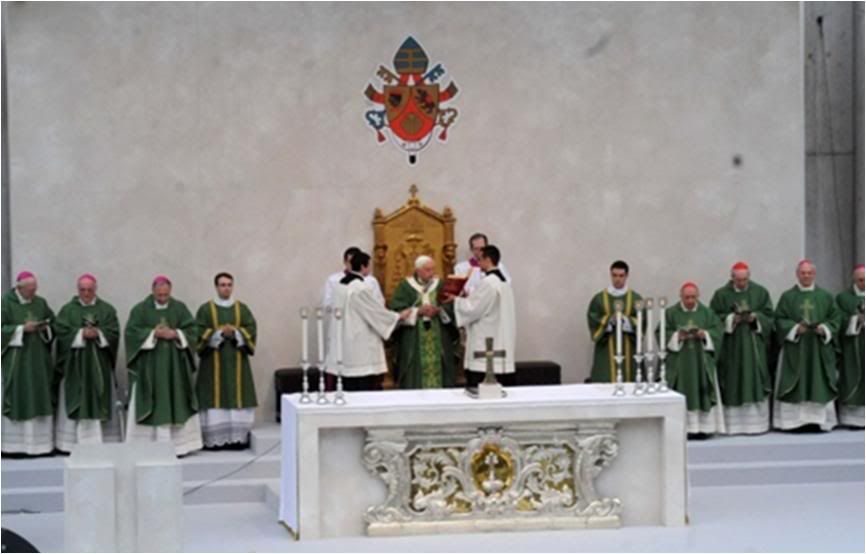
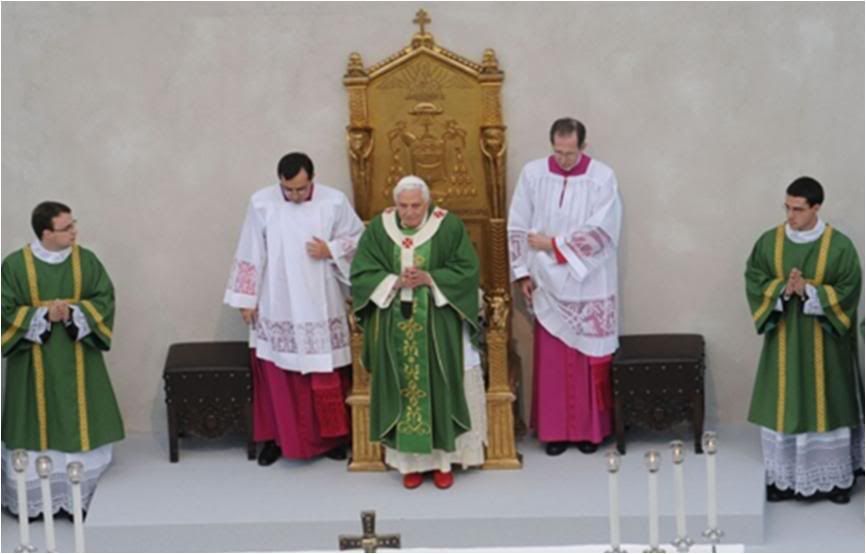
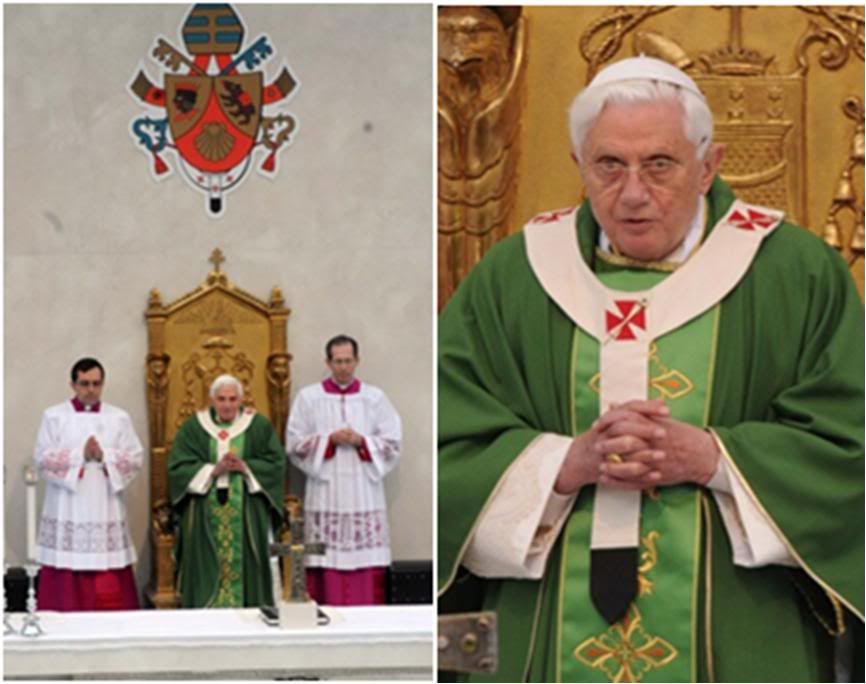
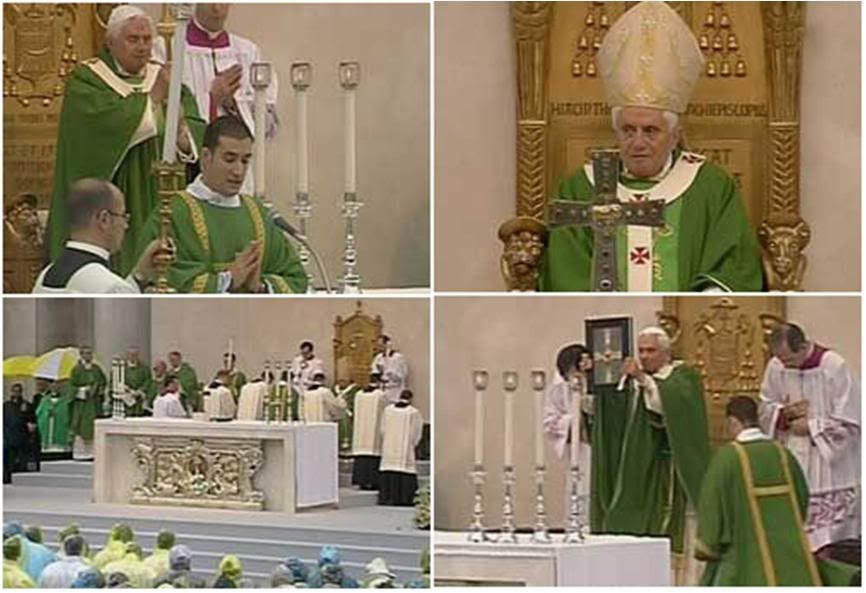
Dear brothers and sisters!
My joy is great to be able to break with you the bread of the Word of God and of the Eucharist, here in the heart of the Diocese of Brescia, where the Servant of God Giovanni Battista Montini was born and underwent his formation as a youth.
I greet you all with affection and thank you for your warm welcome! I particularly thank your Bishop, Mons. Luciano Monari, for the kind words he addressed to me before the Mass, and with him, I greet the cardinals, bishops, priests and deacons, religious men and women, and all pastoral workers.
I thank the Mayor for his words and for his gift, and the other civilian and military authorities. And I address a special thought to all the sick people who are inside the Cathedral.
At the center of the liturgy on this 32nd Sunday in ordinary time, we find the figure of the poor widow, or more precisely, we find the gesture that she makes in casting the last coins she has into the treasure of the Temple.
A gesture which, thanks to the attentive gaze of Jesus, has become proverbial: 'widow's pence' has in fact, become synonymous to the generosity of one who gives without reservation the little that he or she possesses.
First, however, I wish to underscore the importance of the setting in which this Gospel episode takes place, namely, the Temple of Jerusalem, religious center of the people of Israel and the heart of all their life.
The Temple is the place for public and solemn worship, but also of pilgrimage, of traditional rites, and of rabbinical disputes, such as that reported in the Gospel between Jesus and the rabbis of his time - in which, however, Jesus teaches with singular authority, that of the Son of God.
He pronounces severe judgments - as we heard - on the scribes because of their hypocrisy. They, in fact, while showing off great religiosity, were exploiting the poor, imposing obligations which they themselves did not observe.
Jesus, in short, showed that he loved the Temple as a house of prayer, and because of this, he wished to purify it of improper uses, indeed, to disclose its deeper significance, linked to the fulfillment of his own mystery - the mystery of his death and resurrection - in which he himself would become the new and definitive Temple, the place where God and man meet, the Creator with his creature.
The episode of the widow's pence takes place in such context, and it leads us, through Jesus's own point of view, to fix our attention on a fleeting but decisive detail: the gesture of a very poor widow who tosses two coins into the treasure of the Temple.
As he did that day to his disciples, Jesus tells us: Pay attention. Look very well at what the widow did, because her action contains a great teaching - it expresses the fundamental characteristic of those who are the 'living stones' of this new Temple, namely, the gift of oneself to the Lord and to one's neighbor.
The widow of the Gospel, like the widow in the Old Testament, gives everything, gives herself, and places herself in the hands of God, for the sake of others. This is the perennial significance of the poor widow's offering, whom Jesus exalted because she gave more than the rich - who only give part of what they have in excess, whereas she gave everything that she had to live upon (cfr Mk 12,44), and therefore gave herself.
Dear friends, with the aid of this evangelical icon, I wish to meditate briefly on the mystery of the Church, the living Temple of God, and thus pay homage to the memory of the great Pope Paul VI, who consecrated his entire life to the Church.
The Church is a spiritual organism that prolongs in space and time the oblation (offering) made by the Son of God, a sacrifice apparently insignificant compared to the dimensions of the world and history, but decisive in the eyes of God.
As it says in the Letter to the Hebrews - in the text that we heard earlier - for God, the sacrifice of Jesus, offered 'once for all', sufficed to save the whole world (cfr Heb 9,26-28), because in that single oblation was condensed all the love of the Son of God made man, just as in the gesture of the poor widow was concentrated all her love for God and for her brothers. Nothing is lacking, and nothing more can be added.
The Church which is incessantly reborn with the Eucharist, from Jesus's self-giving, is the continuation of that gift, of a superabundance that can be expressed even in poverty, of the 'all' that is expressed in a fragment.
it is the Body of Christ who gives himself entirely, a Body that is broken and shared, in constant adherence to the will of its Head. I am happy that you are deepening your knowledge of the Eucharistic nature of the Church, with the guidance of your Bishop's pastoral letter.
This is the Church that the Servant of God Paul IV loved with passion and sought with all his strength to make understood and loved. Let us reread his thoughts on death, where at the conclusion, he speaks of the Church:
"I could say," he writes, "that I have always loved her... and it is for her, not for anything else, that I have lived. But I wish that the Church would know this".
They are the tones of a palpitant heart which goes on to say: "I would like finally to comprehend all about her, her history, her divine design, her final destiny, her complex, in all her total and unitary composition, her human and imperfect consistency, her disasters and her sufferings, the weaknesses and miseries of so many of her children, in her less sympathetic aspects, and in her perennial effort at fidelity, love, perfection and charity. Mystical Body of Christ! I wish to embrace her, greet her, love her, in every being of which she is composed, in every bishop and priest who assists and guides her, in every soul who lives her and illustrates her; I wish to bless her".
His last words are for her, as the Spouse of his life: "It is to the Church that I owe everything, and all I had. What will I say? May the blessings of God be upon you; be conscious of your nature and your mission; be sensitive to the true and profound needs of mankind; and walk in poverty, that is, freely, strongly and lovingly towards Christ".
What can we possibly add to words so elevated and intense? I would only wish to underscore this last vision of a Church that is 'poor and free' which recalls the Gospel figure of the widow.
That is what the ecclesial community should be in order to be able to speak to contemporary man. The Church's encounter and dialog with mankind in our time were particularly close to Giovanni Battista Montini's heart in all the seasons of his life, from his early years as a priest to his Pontificate.
He dedicated all his energies to the service of a Church that conformed as much as possible to the Lord Jesus Christ, in order that in encountering her, contemporary man would be able to encounter Christ, of whom he has absolute need.
This was the fundamental yearning of the Second Vatican Council, which corresponds to Pope Paul Vi's own reflection about the Church. He wanted to programmatically propose some of its salient points in his first encyclical, Ecclesiam suam, dated August 6, 2004, pre-dating the Conciliar Constitutions Lumen gentium and Gaudium et spes.
With that first encyclical, the Pontiff proposed to explain to everyone the importance of the Church for the salvation of mankind, and at the same time, the need to establish a relationship of mutual knowledge and love between the ecclesial community and society (cfr Enchiridion Vaticanum, 2, p. 199, No. 164).
'Conscience', 'renewal', 'dialog': these three words were chosen by Paul VI to express his dominant 'thoughts', as he called them, at the start of his Petrine ministry - and all three have to do with the Church.
Above all, the exigency that she deepens her awareness of herself: her origin, nature, mission, final destiny. And second, her need to renew and purify herself, looking at Christ as the model; and finally, the problem of her relations with the modern world (cfr ibid., pp. 203-205, nn. 166-168).
Dear friends - and I address myself specially to my brothers in the Episcopate and Priesthood - how can we not see that the question of the Church, of her necessity in the design of salvation, and of her relationship with the world, continue to be absolutely central even today?
That, in fact, the development of secularization and globalization have made this need even more radical, in the face of the rejection of God, on the one hand, and of non-Christian religions, on the other?
The reflection of Papa Montini on the Church is more than ever relevant. And even more precious is the example of his love for the Church, which is inseparable from his love for Christ.
"The mystery of the Church", we read in Ecclesiam suam, "is not simply the object of theological knowledge - it should be lived fact, in which even before having a clear notion of it, the faithful soul can have an almost connatural experience" (ibid., p 229, n. 178).
This presumes a robust interior life which is, the Pope continues, "the great spring of spirituality in the Church, her own way of being irradiated by the Spirit of Christ, a radical and irreplaceable expression of her religious and social activity, inviolable defense and renewable energy in her difficult contact with the profane world" (ibid., p. 231, n. 179).
And it is the Christian who is open, the Church that is open to the world, who have need of such a robust interior life.
Dearest ones, what an invaluable gift for the Church is the lesson of the Servant of God Paul VI! And how exciting it is every time to count oneself in his school! It is a lesson that concerns us all and commits us all, according to the different gifts and ministries of which the People of God are rich, through the action of the Holy Spirit.
In this Year for Priests, I am happy to underscore how much this lesson must interest and particularly involve priests, for whom Papa Montini always had special affection and concern.
In the encyclical on priestly celibacy, he wrote: "'Taken possession of by Jesus Christ' (Phil 3,12), to the point of abandoning all of oneself to him, the priest configures himself more perfectly to Christ even in the love with which the Eternal Priest loved his Body, the Church, offering all of himself for her... The consecrated chastity of his sacred ministers manifests, in fact, the virginal love of Christ for the Church, and the virginal and supernatural fecundity of this marriage" (Sacerdotalis caelibatus, 26).
I dedicate these words of the great Pope to the many priests of the Diocese of Brescia, well represented here, and to the young men who are being formed in the seminaries.
I also wish to recall what Paul VI said to the students of the Seminario Lombardo on December 7, 1968, when the difficulties of the post-Conciliar years were augmented by the ferment in the student world:
"So many," he said, "expect attention-getting gestures, energetic and decisive actions, from the Pope. The Pope is not duty-bound to follow any line other than confidence in Jesus Christ, which is more urgent for his Church than anything else. It will be He who will still the tempest.
"This is not about a sterile or inert expectation, but of vigilant waiting in prayer. This is the condition Jesus has chosen for us so that he can operate in fullness. Even the Pope needs to be helped with prayer" (Insegnamenti VI, [1968], 1189).
Dear friends, may the priestly example of the Servant of God Giovanni Battista Montini, guide you always, and may St. Arcangelo Tadini, whom I venerated earlier in a brief stop at Botticino, intercede for you.
As I greet and encourage the priests, I cannot forget - especially here in Brescia - the lay faithful who in this land have demonstrated extraordinary vitality in faith and good works, in the various fields of apostolate associations and social commitment.
In the Teachings of Paul VI, dear Brescian friends, you can find indications that are always valuable for facing the challenges of the present, especially the economic crisis, migration, and education of the youth.
At the same time, Papa Montini never lost an occasion to underscore the primacy of the contemplative dimension, and therefore, the primacy of God in human experience. That is why he never tired of promoting the consecrated life, in the variety of its forms. He intensely loved the multiform beauty of the Church, recognizing in it the reflection of the beauty of God which shines out from the face of Christ.
Let us pray that the brilliance of divine beauty may shine in each of our communities and that the Church may be a luminous sign of hope for mankind in the third millennium.
May this grace be obtained for us by Mary whom Paul VI proclaimed, at the end of the Second Vatican Council, Mother of the Church. Amen.
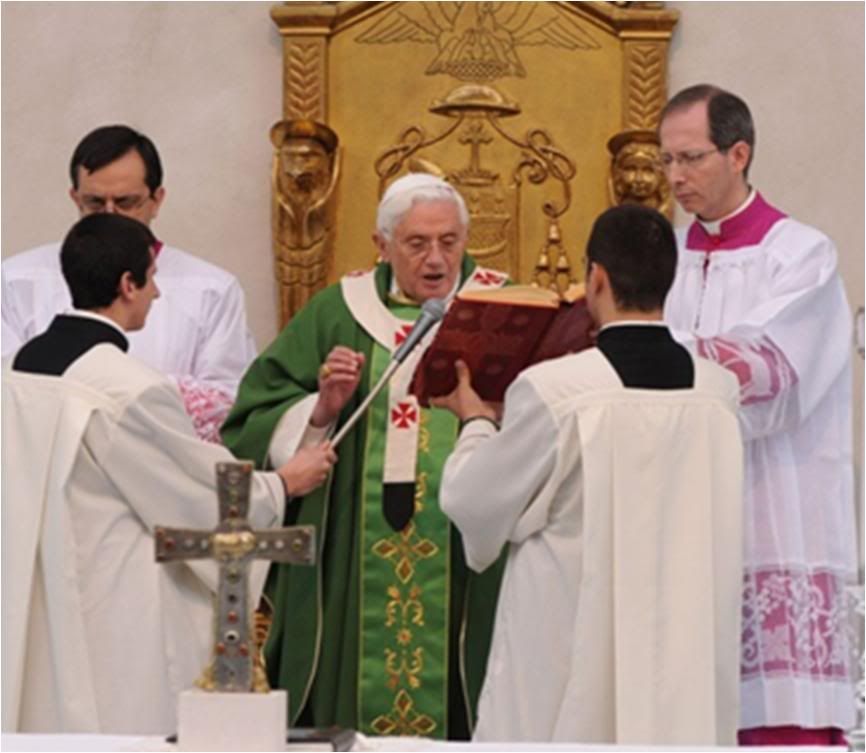
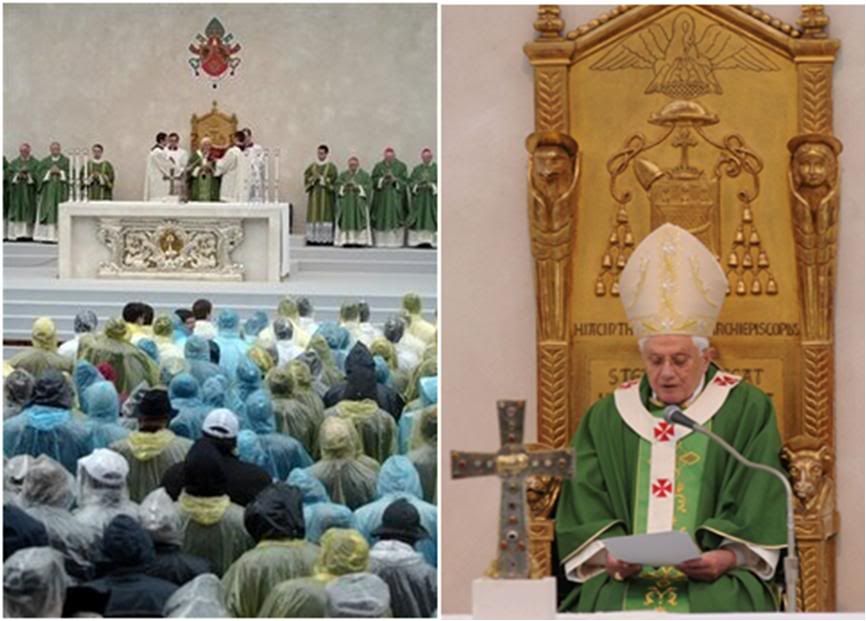
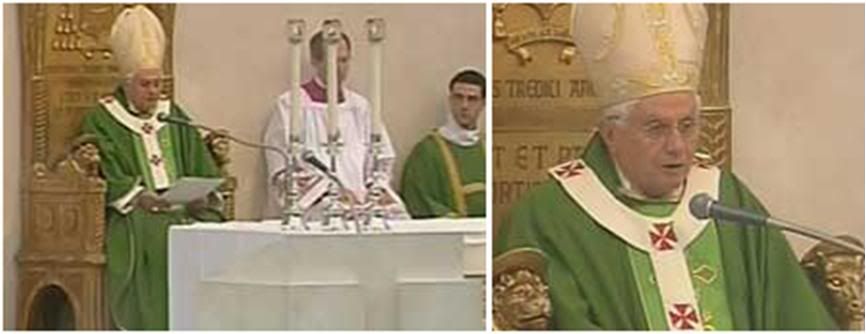
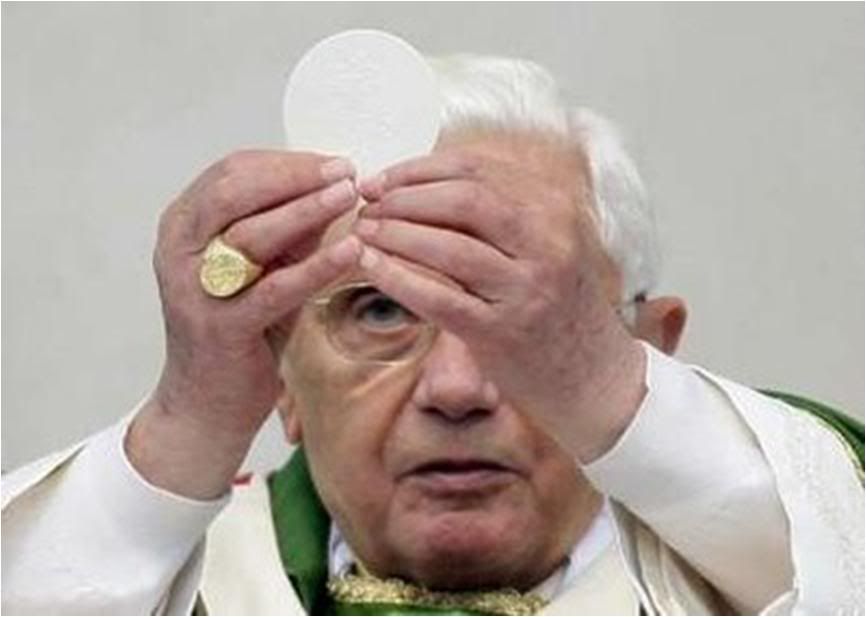
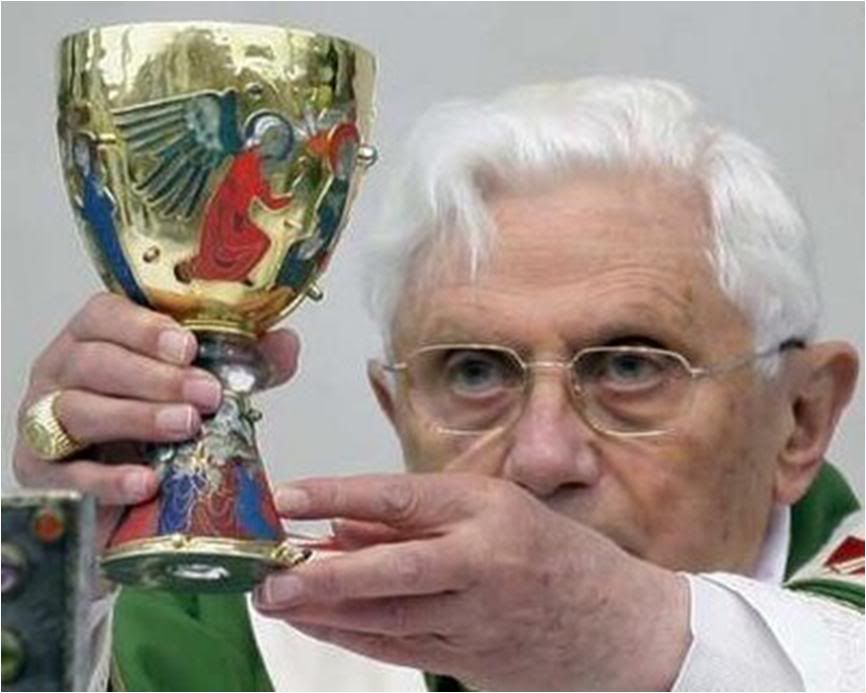
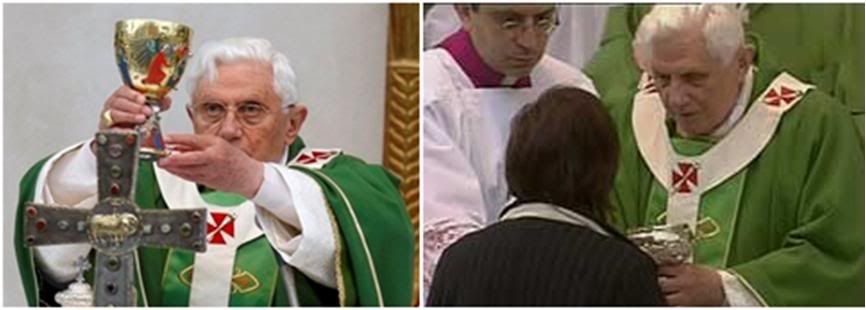
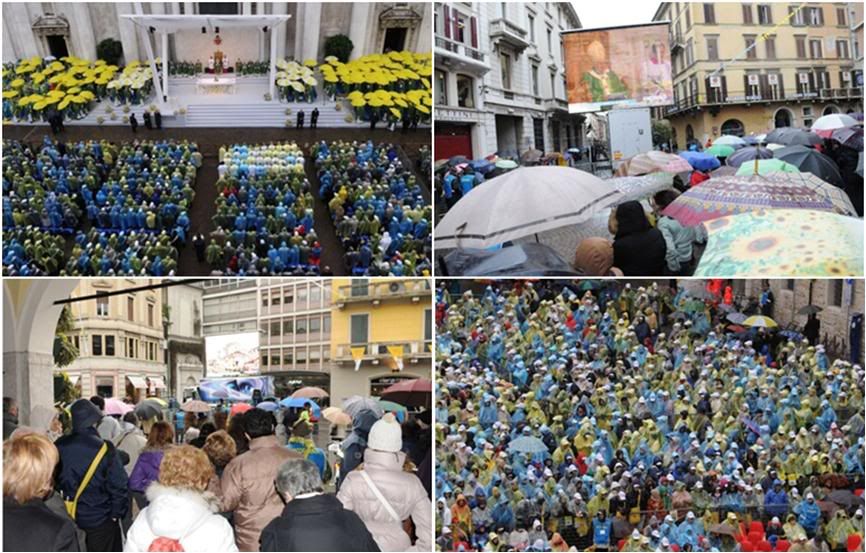 THE ANGELUS
THE ANGELUS
The Holy Father also led the Angelus prayers before the end of the Mass. Because of the rains, the whole schedule was set back by an hour, and the Angelus was recited at 1 p.m. instead of noontime.
Here is a translation of the Pope's message before the Marian prayer:
At the end of this solemn celebration, I thank all those who were responsible for the liturgical animation, and all those who in various ways helpted in the preparation and realization of my pastoral visit to Brescia. Thank you all.
I also greet those who are following us on radio and television, and those who are in St. Peter's Square, particularly the many volunteers of the Unione Nazionale Pro Loco d’Italia.
At this Angelus prayer, I wish to recall the profound devotion that the Servant of God Giovanni Battista Montini always had for the Virgin Mary. He celebrated his first Mass in the Shrine of Santa Maria delle Grazie, the Marian heart of your city, not far from this Piazza. In that way, he placed his priesthood under the maternal protection of the Mother of God, and this attachment accompanied him all his life.
As his ecclesial responsibilities grew, he was also maturing an ever more ample and organic concept of the relationship of the Blessed Virgin Mary with the mystery of the Church.
In this perspective, his closing speech of the third session of Vatican-2 on November 21, 1964, was memorable. That session had promulgated the ecclesial constitution Lumen gentium which, in the words of Paul VI, "has as its summit and crown an entire chapter dedicated to Our Lady".
The Pope noted that it was the broadest synthesis of Marian doctrine ever elaborated by an Ecumenical Council, with the end in view of "manifesting the face of the Holy Church, to which Mary is intimately bound" (Enchiridion Vaticanum, Bologna 1979, p. [185], nn. 300-302).
In that context, he proclaimed the Most Blessed Mary as 'Mother of the Church'(cfr ibid., n. 306), underlining with ecumenical sensitivity, that "the devotion to Mary... is a means intended to orient souls towards Christ and thus reach the Father, in the love of the Holy Spirit" (ibid., n. 315).
Echoing the words of Paul VI, let us today pray likewise: O Virgin Mary, Mother of the Church, we commend to you the Church of Brescia and the entire population of this region. Remember all your children; confirm their prayers to God; keep their faith firm; increase their charity - O clement, o pious, o most sweet Virgin Mary (cfr ibid., nn. 317.320.325).


